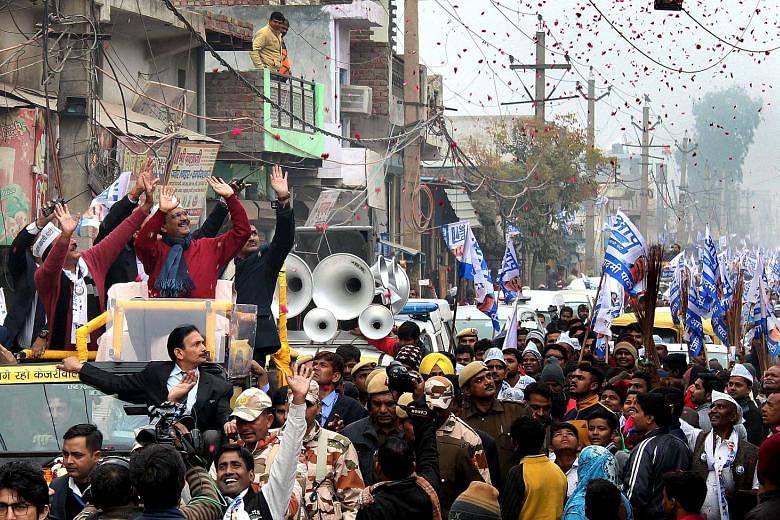Wearing a red sweater, Delhi Chief Minister Arvind Kejriwal is in an open-air jeep, waving to people craning to get a glimpse of him from high-rise balconies during an election campaign swing through Shastri Nager in East Delhi.
His bodyguards warn people against showering petals on the 51-year-old politician, who suffers from bronchitis.
Supporters dressed up as Captain America and Spider-Man as well as drummers are all part of the convoy that weaves through narrow lanes.
Mr Kejriwal, an anti-corruption activist turned politician and leader of the Aam Aadmi Party (AAP), or Common Man party, makes an unusual pitch at his roadshows.
He appeals to supporters of the rival Bharatiya Janata Party (BJP) and Congress not to ditch their parties, but to vote for him nonetheless. "We have made the schools and hospitals efficient with much hard work, all that work should not be undone. Do not leave your parties but vote for AAP," he says.
A tough political battle is unfolding in Delhi with the election on Feb 8 seen as indicating the political fallout, if any, for Prime Minister Narendra Modi who decided to proceed with the Citizenship Amendment Act (CAA), which has triggered widespread protests in cities across the country, including in the capital Delhi.
The Act promises citizenship for non-Muslim illegal immigrants from Pakistan, Afghanistan and Bangladesh, and has been criticised for going against the spirit of India's secular Constitution.
In what is seen as a David versus Goliath battle, the polls in Delhi have largely ended up as a two-cornered fight between the BJP and the AAP, a seven-year-old party forged on the back of an anti-corruption drive.
Once a dominant force in the city, the Congress party has little traction with voters now but analysts said it could still draw them away from the AAP, with both parties targeting the poorer sections of the electorate.
Dr Manisha Priyam, an associate professor at the National University for Educational Planning and Administration, said: "It's a very complicated election. I think it's an absolutely local governance and development-focused election from the people's perspective. But we cannot deny that the central (federal) government is right here and has had nationalistic legislation."
Delhi has an unusual power structure. It has its own assembly but is also the seat of federal power. The capital is ruled by a state government, but the federal government has jurisdiction over the police and land-related issues.
The city of over 18 million people is a melting pot with migrants from all over the country searching for a better life.
In 2015, the AAP won 67 out of 70 seats in the Delhi Assembly, even though the BJP had stormed into power with a landslide win in the general election just a year earlier.
The BJP, which won just three seats in the 2015 polls, is anxious for a victory in Delhi following back-to-back losses in recent state elections in Jharkhand and Maharashtra which have reduced its political dominance, at least at the state level. The Delhi results will be out on Feb 11.
In the capital, as elsewhere, the BJP is banking on the popularity of Mr Modi, who features prominently in all campaign material.
Mr Harish Khurana, a BJP spokesman in the capital, said: "When we were in power in 1993, the BJP started planning the Delhi Metro. Where would we be without the metro today? That is the kind of vision we are promising to (the) people of Delhi. We are ready to make it (the CAA) an issue and explain to people."
Analysts point out that while the BJP can weather a loss, the AAP, with its political presence mainly in Delhi, would pay a heavier price in the event of a defeat.
The AAP trumpeted itself as an alternative to the other parties when it burst onto the political scene, managing in the process to attract support from a wide range of voters from different professions and backgrounds. But, over the past eight years, it has evolved into a traditional political party.
Mr Praveen Rai, a political analyst at the Centre for the Study of Developing Societies, said: "The assembly elections in Delhi have always been a prestige battle. The 2020 elections will have a limited impact on national politics. However, it would be a test marketing of CAA and citizens' response, and if the BJP wins, it would provide traction in carrying forward its agenda.
"A loss in this hustings would not have much impact on the saffron party (BJP) but for AAP, it is a do-or-die battle, and it has to win to stay politically alive and relevant in Indian politics."

